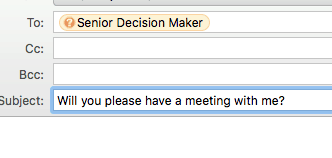Last Friday I received 56 unsolicited emails.
56 in one day. And that’s just the one’s that managed to get through my spam filters (note that when I say unsolicited, for many of them I probably did sign up or get added to their mailing lists at some point in time).
Of those 56 I clicked on 11 and deleted the rest without opening them. I counted this because last week I had a question from someone on my video training series about writing compelling sales emails asking me about what to write in a subject line to make someone want to open it.
It’s a great question – you can write the best sales email you have ever written in your whole life, but if the subject line sucks, it will get deleted before it has a chance to get read. Of the 11 that I chose to read based on their subject line, 7 of them turned out to be spam (or what I consider to be spam – content that has no real relevance to me and what is happening in my world right now). I’m sure a number of those I deleted without opening them would probably have turned out to be more interesting to me than some I actually clicked on. But as the receiver of a lot of unsolicited emails, and someone who is pretty busy, I have to have a system in place that reduces the chance I will waste some of my time on something irrelevant to me.
Which is why the subject line of the emails I receive is so critical to bypass my personal spam filter.
Most senior executives I know have a similar filtering system – done either by them of their EA who acts as their email gatekeeper – and most get way more unsolicited emails than me. This means that if you are sending an email to one of these people to try and get a meeting with them, the subject line of your email is critical to your success rate.
What to write in a subject line to increase its chance of getting opened
Firstly, there needs to be a connection between the subject line and the content. You can’t just write what you think is a great hook to try and get them to open your email, and then when they open the email they find it’s a sales pitch all about you. All that does is ensure they will never open an email from you again.
The subject line has to be something which when the recipient receives it they are immediately thinking ‘that is something that is really important to me right now’. Not just of vague interest, but critical interest. Most email subject lines I receive have literally nothing to do with anything I truly care about. Some are of vague interest and I may click on those, but it all depends on how busy I am, so it’s a risky bet. A few are right in the centre of my world and I always open those.
Let me give you an example.
Let’s imagine there was a real estate agent trying to get a meeting with me to see if I was in the market for selling my house. I have never met them before and they don’t yet know if I want to sell. Here are three potential subject lines:
- Can I help you sell your property in Brisbane?
- How people in Brisbane are maximising profits on the sale of their property.
- Future property price trends by suburb in Brisbane
Subject line 1 is awful and will be deleted along with the emails professing to be able to reverse the ageing process. It is totally self- oriented to the writer, and presumes I want to sell my house and that I want the senders help.
Subject line 2 is less self-oriented but still assumes that I want to sell a property in Brisbane. If I have a vague interest in selling then I may open it – but if I don’t I will likely delete it. As the sender, it’s a risky strategy to take as the subject line has still primarily been written only for those who want to sell their property right now.
Subject line 3 I will click on, regardless of whether I am currently looking to sell my property or not. I am always interested to know how my current property is performing, and I have another need that this taps into – I am currently considering whether we should buy an investment property, but am not sure where or when. I would welcome a meeting with an agent who was genuinely interested in providing me with ideas and insights to help with this.
A closing word of caution about your subject lines
When you’re writing your subject lines, make sure to avoid any language that comes across as self-oriented about what you do, what you want to do, or how you want to help the person you are sending the email to. Make sure the subject line aligns to the content of your email – which should be full of suggested value they are going to take away from a meeting with you.
But remember that with all things sales, this must be genuine. Don’t write click-bait subject lines just to lure buyers in so you can try to sell something to them. That’s a fast track way to get your email into the rubbish bin.
If you’re interested in learning more about how to write compelling sales emails, check out my free video training series where I share what the best of the best B2B sellers do to get meetings with decision makers.
You can watch the videos here. If you want to join in the conversation about this topic, head over to my LinkedIn post here.


